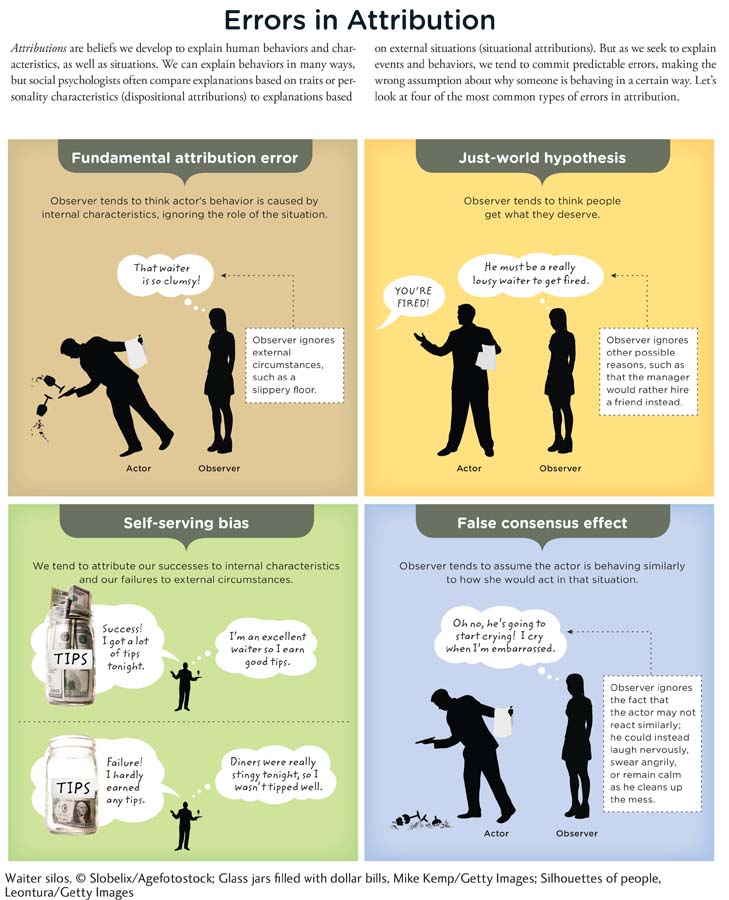Chapter 1. Chapter
Infographic
Scientific American: Psychology
Infographic Activity 14.1: Errors in Attribution
Errors in Attribution

Attributions are beliefs we develop to explain human behaviors and characteristics, as well as situations. We can explain behaviors in many ways, but social psychologists often compare explanations based on traits or personality characteristics (dispositional attributions) to explanations based on external situations (situational attributions). But as we seek to explain events and behaviors, we tend to make predictable errors, making the wrong assumption about why someone is behaving in a certain way. Let’s look at four of the most common types of errors in attribution.
Click the image to enlarge.
Click "Next" to continue.
1.1 Quiz
1. During her lunch break, Yvonne and Belinda decided to walk to a local fast food restaurant to have a quick meal. Near the door, they were approached by a clearly homeless person who asked, “do you ladies think you could spare just a little change?” Yvonne reached into her purse and gave the man a quarter, but Belinda just sighed and ignored him. Once they got into the restaurant, she said, “Yvonne, you are so nice. I just can’t give money to people who are homeless because they refuse to get a job and work for their own paycheck.” Belinda’s belief that people get what they deserve is an attribution error called the
| A. |
| B. |
| C. |
| D. |
2. A(n) ________ refers to a belief that we develop to explain human behaviors and characteristics, as well as situations.
| A. |
| B. |
| C. |
| D. |
3. Charles is going to the local polling center to vote in the yearly election. He will choose different candidates for political positions, as well as vote on major issues that affect his community. He is going to cast a vote in favor of providing increased funding for his local community college, and he thinks to himself, “why are we even voting on this? Everyone is going to support the school and vote to give them more money. I can’t imagine why anyone would vote against this!” Charles’s belief demonstrates the ________ effect.
| A. |
| B. |
| C. |
| D. |
4. When Allison passes her psychology exam with a very high grade, she thinks, “I am very smart, and boy did I study hard. I’m some kind of awesome student!” When he fails her sociology exam, however, she thinks, “that teacher did a terrible job of presenting the material, and the exam was so unfair.” Which kind of biased thinking is Allison using in this instance?
| A. |
| B. |
| C. |
| D. |
5. Every time his students show up late to class, Professor Marin automatically assumes that they are just lazy and failed to get out of bed on time. He does not consider that perhaps their bus came late, they had a personal emergency, or some other situation outside of their control may have made them late. Professor Marin’s assumption that internal characteristics explain the students behaviors is called the ________ error.
| A. |
| B. |
| C. |
| D. |
6. When you assume that a person’s actions were the result of internal characteristics like personality traits or abilities, you are making a(n) ________ attribution.
| A. |
| B. |
| C. |
| D. |